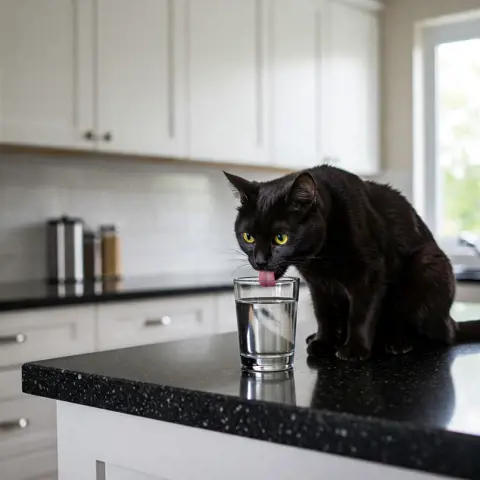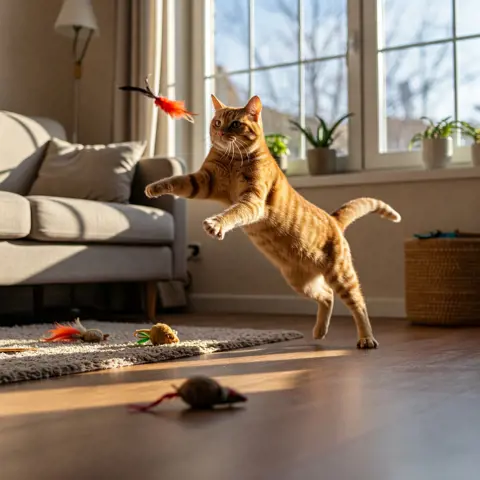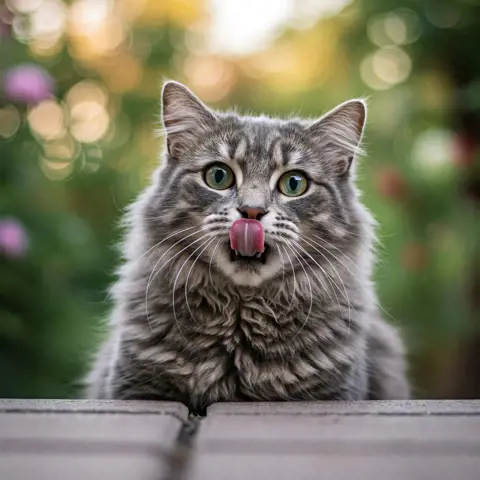Why Do Cats Stick Their Tongue Out? Understanding the Reasons and When to Worry

In This Article
Why Do Cats Stick Their Tongue Out?Possible Health Concerns When Cats Stick Their Tongue Out
Behavioral and Environmental Triggers
Cats Sticking Their Tongues Out While Relaxed or Sleeping
When to Worry and Consult a Vet
Conclusion
If you've ever noticed your cat sticking their tongue out and wondered if it's a quirky habit or a sign of something more serious, you're not alone. Cats sticking their tongues out—often called a "blep"—can be adorable, but it's not always just a funny moment. It might mean they're relaxed, analyzing scents, or even dealing with dental issues or stress. While this behavior is usually harmless, it can sometimes signal health concerns like drooling, breathing problems, or discomfort. Understanding why your cat does this can help you decide if it's time to call the vet or simply snap a cute picture.
Check out this video on YouTube about cats sticking their tongues out for more insights.
Why Do Cats Stick Their Tongue Out?
There’s something undeniably charming about seeing your cat with its tongue sticking out. Commonly referred to as "blepping," this behavior can be a source of endless amusement for pet owners. But beyond the cuteness factor, there are several reasons why cats exhibit this behavior. Sometimes it's perfectly normal, while in other cases, it might signal a health concern. Read on to understand why your cat might have this quirky habit.
Funny Cat Behavior: Blepping

The "blep" is a favorite term among cat lovers, used to describe the adorable moment when a cat leaves its tongue sticking out ever so slightly. This often happens when your cat gets distracted mid-action—whether grooming, sniffing, or tasting something. Once their attention shifts, their tiny tongue just stays out, as if they forgot to put it back. Cats typically "blep" when they're relaxed or curiously investigating something new in their environment.
Interestingly, the blep also ties into how cats analyze their surroundings. It's linked to the Flehmen response, where animals use their tongues to collect scents and transfer them to the Jacobson’s organ (a special sense organ located on the roof of the mouth). This behavior allows your feline friend to experience smells on a whole different level—like tasting the air!
While blepping is generally harmless and often just part of their exploration or relaxation, it's important to observe context. If this happens sporadically, you’ve likely got nothing to worry about. For more insights on the blepping behavior, check out this detailed explanation about bleps in cats.
When Is It Normal for Cats to Stick Their Tongue Out?
Cats sticking their tongues out isn’t just about being camera-ready (though it sure makes cute photos). There are several everyday, normal scenarios where this behavior naturally occurs.
- During Grooming Sessions
Grooming is a big part of cat life, and sometimes halfway through licking their fur, their tongue just sticks out for a moment. Yes, they can get "stuck" in mid-lick if they’re interrupted or suddenly distracted. This is completely normal. - Eating and Drinking
During or after meals, you might notice your cat sporting the "tongue-out look." This is usually a sign of them cleaning up residual food particles or transferring water. It also helps scoop food efficiently. For a detailed dive into behavioral reasons for sticking tongues out, check this informative article by Hill's Pet. - Relaxation or Sleeping Moments
Relaxed cats might show their tongues because their jaw naturally loosens when they're at ease. Imagine how humans sometimes sleep with their mouths open—cats experience something similar! Older cats may be more prone to this due to decreased muscle tone, but even young cats enjoy a little tongue-out nap from time to time.
Although this behavior is usually adorable and harmless, take note of frequency and additional symptoms. If there’s concurrent drooling, labored breathing, or pawing at the mouth, it’s worth consulting with your veterinarian for further evaluation.
Cats are full of quirks, and their tongue antics are just one of many. Whether it’s a funny blep moment or their natural grooming behavior, there’s often no need for concern. Keep observing your cat for other signs to ensure their tongue-out habit is normal and not a sign of distress.
Possible Health Concerns When Cats Stick Their Tongue Out
While seeing your cat stick their tongue out might be endearing, it can sometimes indicate underlying health issues. Paying close attention to the context and accompanying symptoms can help you understand whether this quirky behavior demands medical attention. Below are some potential health-related reasons why your cat might be sticking their tongue out.
Dental and Oral Health Issues
Dental problems are one of the most common reasons cats exhibit tongue-out behavior. Cats experiencing dental pain, gum disease, or even missing teeth may find it difficult to keep their tongue comfortably inside their mouth. Some potential oral health concerns include:
- Gum Disease and Periodontitis:Inflamed or infected gums can make it uncomfortable for cats to close their mouths properly, causing the tongue to hang out.
- Broken or Missing Teeth:If a cat has lost teeth or has teeth misalignment, they may fail to keep their tongue neatly positioned.
- Tooth Abscesses:Painful infections at the root of a tooth can lead to unusual mouth movements or an inability to retract the tongue.
If your cat’s tongue is sticking out frequently and is accompanied by signs such as bad breath, drooling, or difficulty eating, it’s a good idea to consult your veterinarian. For more insights into dental causes, check out this article on why cats stick their tongue out due to oral health problems.
Respiratory or Neurological Issues
In some cases, a cat sticking its tongue out can point to more serious medical conditions, including respiratory or neurological disorders. These conditions often affect a cat’s breathing or muscle control, leading to unusual behaviors.
- Respiratory Problems:Cats dealing with congestion or difficulty breathing may keep their tongue out as they struggle to take in more oxygen. Watch for signs like panting or wheezing.
- Neurological Disorders:Illnesses affecting the brain or nerves—such as trauma, seizures, or congenital disorders—can alter a cat’s ability to control facial muscles and tongue movement.
If you notice additional symptoms such as lethargy, unsteadiness, or labored breathing, seek veterinary guidance immediately. Early detection is key in managing these potentially serious conditions.
Cats Sticking Their Tongue Out and Drooling
Excessive drooling alongside tongue-out behavior can often signal a specific issue rather than just a quirky habit. When drooling is observed, consider the following possibilities:
- Nausea or Poisoning:Cats suffering from upset stomachs or exposure to toxins may drool excessively and stick their tongues out as a reflex.
- Dental Discomfort:As mentioned earlier, oral health issues like tooth decay or gum disease can cause discomfort, with drooling becoming a byproduct.
- Foreign Objects:Something stuck in your cat’s mouth or throat might lead to a combination of tongue-out and drooling behavior.
If there’s frequent drooling or if your cat stops eating altogether, prioritize a visit to the veterinarian. A professional can rule out serious causes and recommend the best course of action. For further information on drooling paired with tongue-out behavior, take a look at this detailed overview on dental-related tongue behavior.
Behavioral and Environmental Triggers

Cats sticking their tongues out might seem amusing at first glance, but their behavior often carries underlying meanings tied to their instincts and emotional state. Two notable factors behind this phenomenon are behavioral cues like the Flehmen response and reactions to stressors in their environment. Let’s explore these.
The Flehmen Response: A Unique Way Cats "Taste" the Air
Have you ever seen your cat stick their tongue out and appear to freeze in place, almost sneering? This isn’t just a funny face—it’s called the Flehmen response, a fascinating behavior cats use to analyze scents around them. When your cat finds an intriguing smell—like another cat’s scent or a new object—they may open their mouth slightly, curl back their upper lip, and extend their tongue. By doing this, they direct the scent particles toward their vomeronasal organ (also known as the Jacobson’s organ), which is located on the roof of their mouth. This special organ helps them process smells more deeply than their regular olfactory system.
Think of it like a “smell analyzer” that decodes pheromones and other signals invisible to us. Your cat isn't just sniffing; they're essentially "tasting" the air to gather extra details about their environment. For example, they might catch pheromones left by other cats or even just explore the scent of your shoes after being outside.
Want to learn more about the Flehmen response? Here's an excellent guide on how cats use this behavior to assess scents.
Stress and Anxiety in Cats
Stress can manifest in surprising ways for cats, and sticking their tongues out might be one of them. Much like how some humans bite their lips or fidget when nervous, cats may react to anxiety by losing control over their facial muscles momentarily, leading to tongue-out behavior. Stressful events like loud noises, unfamiliar visitors, or car rides can overload their senses and trigger this reaction.
You might also notice other signs alongside the tongue-out behavior:
- Excessive panting or open-mouth breathing
- Dilated pupils
- Hiding or cowering in corners
- Over-grooming or licking behaviors
In some cases, cats might stick their tongues out during a long car ride or in a vet clinic because they’re breathing heavily from stress. Their tongue extends to help with heat regulation or to cope, similar to panting in dogs. If stress is a recurring issue for your feline, creating a calm environment with comfort items—like a favorite blanket or pheromone sprays—can make a big difference.
For tips on recognizing and reducing anxiety in cats, check out this resource on cat stress management.
Understanding these triggers will help you better care for your pet while also demystifying their quirky behaviors.
Cats Sticking Their Tongues Out While Relaxed or Sleeping
Cats have a knack for making even the simplest behaviors look charming, and sticking their tongues out is no exception. You may have noticed your feline doing this while drifting off into dreamland or lounging lazily in their favorite spot. While the sight might be irresistibly cute, understanding why it happens ensures you know when it’s just a quirk and when it’s something to watch. Let’s explore why cats stick their tongues out while sleeping and how to spot signs of potential trouble.
Why Do Cats Stick Their Tongue Out While Sleeping?
Have you ever looked at your sleeping pet and noticed their tongue gently peeking out? This behavior is more common than you'd think and typically isn't a reason for concern. Cats often let their tongue slip out when they are in a deep state of relaxation or fast asleep, for a few physiological reasons:
- Relaxed Muscles: Just like humans can sleep with their mouth hanging open, a cat's jaw muscles may relax during deep sleep, allowing the tongue to fall slightly out. This looseness is particularly common in older cats who may experience reduced muscle tone. According to Hill's Pet, this type of behavior is linked to overall body relaxation during restful moments.
- After Grooming: Cats are meticulous groomers, and their tongues work overtime to keep their fur clean. A tongue sticking out during or after a nap could simply mean your cat was interrupted midway through grooming and never tucked their tongue back in. It’s like hitting pause on a game mid-motion—a behavior that’s neither serious nor concerning.
- Deep Sleep Signs: Cats cycle through different phases of sleep, including REM (Rapid Eye Movement). During these deeper phases, their body enters a completely relaxed state, and their tongue might protrude. As PawMaw explains, this is just one of many endearing signs that your feline has reached a state of true comfort.
- Face and Jaw Shape: Some breeds, like Persians or other flat-faced cats (brachycephalic breeds), are more prone to sticking their tongues out. For these cats, the anatomy of their face may make it harder to keep their tiny tongues fully retracted, even when they’re not fully asleep.
While the reasons above highlight normal and endearing behavior, context matters. If your cat adds twitching paws and snoring to the mix, you’re likely witnessing your blissful buddy having a satisfying snooze.
When Cute Moments Might Signal Trouble
Not every adorable tongue-out moment is as innocent as it seems. While relaxed muscles and post-grooming bleps are common, it’s important to keep an eye out for additional symptoms that may signal underlying health concerns. Here’s how to tell the difference between quirky feline behavior and a potential problem:
- Frequent Drooling:A common pairing with tongue-sticking behavior, excessive drooling could point to dental issues, oral infections, or even something stuck in your cat’s mouth. If your feline doesn’t seem to be comfortably grooming or eating due to this behavior, it might be time to consult a vet.
- Labored Breathing or Panting:Cats don’t pant like dogs do. If your cat’s tongue sticks out while sleeping and is accompanied by open-mouth breathing, wheezing, or struggling to catch their breath, take note. According to this Reddit thread on sleeping cats, this could indicate respiratory stress, which warrants immediate attention.
- Irregular or Sudden Behavior:If your cat suddenly develops the habit of sticking their tongue out during naps without prior instances, keep track of timing and repetition. Unexpected changes in behavior are often worth discussing with your veterinarian.
- Signs of Stress or Pain:Sometimes, what looks like relaxation is actually a sign of discomfort. Cats experiencing dental pain, nausea, or even neurological issues might stick out their tongue instinctively. For example, cats with missing teeth or jaw alignment issues may find it harder to keep their tongue in place while they rest.
If your cat’s tongue-out behavior is combined with a lack of appetite, lethargy, or excessive grooming, it’s worth scheduling a vet visit. Many tongue-related quirks are harmless, but recognizing when they’re not can make all the difference. For a closer look at when sleeping habits might indicate trouble, check this detailed guide from Catster.
By staying observant and learning to differentiate these behaviors, you’ll not only enjoy your cat’s quirky moments but also feel confident that you're keeping them safe and healthy.
When to Worry and Consult a Vet

While a cat sticking its tongue out might look amusing, it isn’t always something to laugh about. Sometimes, it’s an indicator of underlying health or age-related issues that require closer attention. Knowing when to monitor your cat at home and when to seek veterinary advice is pivotal to keeping your furry friend healthy and comfortable. Below are key situations that may signal it’s time for a professional evaluation.
Observing Accompanying Symptoms
If your cat sticking its tongue out is sporadic and isolated, it may just be a harmless quirk. However, specific symptoms accompanying this behavior can indicate something more serious. Here’s what to look for:
- Bad Breath:Persistent foul-smelling breath isn’t just unpleasant; it’s often linked to dental issues like gum disease or tooth decay.
- Excessive Drooling:While some cats drool when relaxed, excessive drooling paired with tongue-out behavior could point to oral discomfort or nausea.
- Difficulty Eating or Weight Loss:Struggling to eat, chewing on one side, or sudden weight loss may indicate dental issues or an oral mass.
- Panting or Labored Breathing:Cats don’t pant like dogs. Open-mouth breathing or labored breaths should raise concerns about respiratory stress.
- Behavioral Changes:Lethargy, hiding, or unusual aggression combined with the tongue sticking out could signal pain or discomfort.
When you notice these symptoms, consulting your veterinarian is essential. Early intervention can catch conditions like periodontal disease or respiratory issues before they worsen. For more insights, you can check this informative article on health concerns with tongue-out behavior.
Age-Related Concerns in Cats
Age plays a significant role in how cats display tongue-out behavior. Younger cats and kittens, for instance, might stick their tongues out more frequently but usually for benign reasons like exploring their environment or reacting to new smells. However, senior cats could be exhibiting this behavior as part of age-related changes that warrant further examination.
- Kittens and Young Cats:It’s common for kittens to hold their tiny tongues out while playing, grooming, or even sleeping. Their growing curiosity and developing neurological system often make this behavior harmless.
- Senior Cats:Older cats might exhibit tongue-out habits linked to age-related health issues, such as:
- Dementia:Some senior cats develop cognitive decline, which may result in tongue protrusion along with confusion or disorientation.
- Dental Wear:Aging naturally increases the risk of tooth loss or misalignment, causing difficulty in keeping the tongue inside the mouth.
- Muscle Tone Loss:Decreased muscle strength around the jaw in older cats might lead to a relaxed tongue, especially during rest.
If this is new behavior in your senior cat or if it occurs alongside bad breath or drooling, schedule a vet check-up to rule out any progressive conditions. For more details on potential age-related causes, this guide on understanding cat tongue behavior may be helpful.
Understanding these concerns allows you to determine when your playful or snoozy cat’s tongue-out moment is adorable and when it might mean there’s more going on below the surface. Keeping track of frequency, context, and additional symptoms will help you partner with your vet for the best care possible.
Conclusion
Cats sticking their tongues out is often just another one of their amusing quirks, whether it's during a cozy nap or as part of their grooming routine. For the most part, this behavior is harmless and even endearing, especially when it happens in relaxed or playful moments. However, it’s essential to stay alert to patterns and accompanying signs like drooling, bad breath, or changes in breathing, as these could point to underlying health concerns.
Trust your instincts as a pet owner. If something feels off or your cat’s tongue-out moments become frequent or unusual, don't hesitate to consult your veterinarian. Early attention can make a big difference in addressing potential issues.
Remember, the occasional “blep” is just part of what makes cats so lovable. So grab your camera for those cute moments, and keep a watchful eye for anything out of the ordinary to ensure your furry friend stays happy and healthy.
Frequently Asked Questions
- Why does my cat stick its tongue out randomly?
- Cats might stick their tongues out when they're grooming and forget to pull it back in, or it could be a relaxed posture. It’s usually harmless unless accompanied by other signs of distress.
- Is it normal for cats to stick out their tongue while sleeping?
- Yes, it's normal. When cats sleep deeply, their muscles relax, including the tongue. If they’re especially relaxed, their tongues might slip out slightly.
- Could sticking their tongue out mean my cat is sick?
- It can be. If your cat seems tired, has trouble eating, or is drooling excessively along with their tongue sticking out, it could indicate dental pain, heatstroke, or other health issues. Consult a vet if you notice any unusual behavior.
- Do cats stick out their tongue when they’re stressed?
- Yes, stress or fear can cause cats to stick out their tongues briefly. It might happen after a hiss or panting, which can indicate discomfort.
- Why does my cat keep flicking its tongue?
- Frequent tongue flicking may be their way of tasting the air or smelling something unusual. Cats have a special organ called the Jacobson's organ that helps with this.
- Is sticking their tongue out connected to grooming?
- Often, yes. Cats use their tongues for cleaning and may leave them out by accident during or after grooming. It’s common and not a reason to worry.
- Does the blep have a purpose?
- A blep (when a cat’s tongue tip sticks out slightly) can happen when cats taste or smell something peculiar. It’s also a sign they’re relaxed or just forgot to pull it back in after grooming.
- Can dental issues cause cats to stick out their tongue?
- Yes, dental problems like loose teeth, gum disease, or mouth ulcers might make it uncomfortable for a cat to fully close its mouth, leaving its tongue exposed.
- Is tongue-sticking common in older cats?
- Older cats may do this more often due to dental problems, jaw muscle relaxation, or medical conditions. If your senior cat starts this behavior suddenly, get them checked by a vet.
- Should I worry if my cat breathes with its tongue out?
- Yes, panting or open-mouth breathing with their tongue out could be a sign of heatstroke, respiratory issues, or pain. Contact a vet if this happens.
- What does it mean if my cat's tongue hangs out for a long time?
- If your cat's tongue stays out for an extended period, it could be due to dental or neurological issues, or even an injury. Seek veterinary care if this is ongoing.
- Do certain breeds stick their tongues out more often?
- Flat-faced breeds like Persians and Exotic Shorthairs may show this behavior more often because of their facial structure, which can make it harder to keep their tongue fully inside.
- Can medication cause my cat to stick out its tongue?
- Certain medications may cause side effects like muscle relaxation or dry mouth, which can make your cat’s tongue stick out. If this happens, check with your vet to ensure the medication is safe.
- Why does my kitten stick its tongue out?
- Kittens might stick their tongues out when they’re exploring new tastes or smells. It can also happen during grooming practice. Unless paired with abnormal behavior, it’s usually not a concern.
- When should I call a vet about my cat sticking its tongue out?
- If your cat shows other symptoms like drooling, weight loss, not eating, panting, or behavioral changes, consult a vet. Prolonged or unusual tongue-sticking may signal a health issue.
CatsLib.com relies on trusted, high-quality sources, including peer-reviewed research, to back the information in its articles. We regularly review and update our content to ensure it remains accurate and reliable.
If you have concerns about your pet's health or any medical questions, we highly recommend consulting a qualified veterinarian. The information on this site is for general informational purposes only and should not be used as a substitute for professional advice, diagnosis, or treatment.
- Wolf, A. M., & Clark, K. A. (2014). Feline Geriatrics: Understanding Aging in Cats.
- Lue, T. W., Pantenburg, D. P., & Crawford, P. M. (2008). Impact of Aging on Feline Health.
- Debra Eldredge. Cat Owner's Home Veterinary Handbook
- Gary Landsberg et al. Behavior Problems of the Dog and Cat
- Understanding Excessive Drooling in Cats
- Common Cat Behaviors and What They Mean
- Feline Grooming Behavior
- Cat Health Guide
How We Ensure Accuracy
At CatsLib, we take the accuracy of the information we provide very seriously. Our content is created and reviewed by experts to ensure that every piece of advice is not only helpful but also based on the latest veterinary research. Here’s how we make sure the information you read is reliable:
- ✔ Content reviewed by certified experts
- ✔ Based on up-to-date veterinary research
- ✔ Reviewed regularly for relevance and accuracy
Recent Articles

Why Are Siamese Cats Cross Eyed? Genetics, Health, and Care Guide

Do Ragdoll Cats Shed a Lot? Seasonal Tips to Manage Fur and Keep Your Home Clean

10 Medical Reasons Your Cat Is Walking in Circles – Signs You Should Never Ignore

Why Does Your Cat Scratch Around Its Food Bowl? Top Reasons and Simple Solutions

